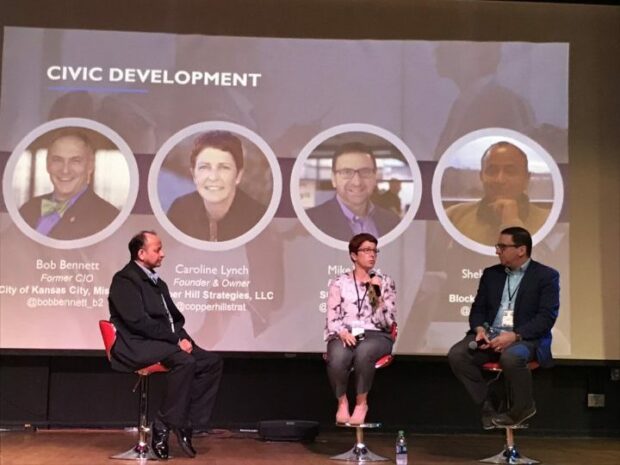HOME | ABOUT US | MEDIA KIT | CONTACT US | INQUIRE
HOME | ABOUT US | MEDIA KIT | CONTACT US | INQUIRE

If hearing the phrase “blockchain” brings to mind cryptocurrencies, the dark Web, Elon Musk’s thought process, or any number of things that cause mental confusion and duress, then you’re not alone.
Even though those things are involved with blockchain, they don’t define what it is–a distributed ledger of transactions in electronic form that can be viewed and distributed by specific parties. Speakers at the inaugural BlockchainKC event today, at the Plexpod Westport Commons, described some ways it can be applied to everyday life, especially when dealing with government agencies.
Cities (as well as states, counties and the federal government) today are split into several departments–Kansas City reportedly has 19. Oftentimes, residents trying to accomplish a task involving the city must deal with more than one of them. They’re likely to need to bring paperwork from one department to another and make payments for services at more than one.
Businesses and organizations starting tech-based blockchain platforms are now trying to understand what systems need streamlining and how to go about it. For example, said Caroline Lynch, founder of Arizona-based government-consulting firm Copper Hill Strategies, it’s ridiculous that she needs to pay an agency a fee to obtain a copy of her law degree, something she earned and paid for herself, and then transfer it to another agency, paying yet another fee. A blockchain platform could allow all three to view the document, as well as any other entities that have security permission.
By making a time-stamped notation on each of its steps, a blockchain platform could, for example, track a property tax payment all the way to where it is finally allocated as tax revenue and spent. After all, “a lot of it is probably still paper -heavy,” Lynch says, and tracking processes like that can take several days under the current system. The problem when creating these blockchain platforms, though, she says, is that government agencies are still reluctant to share data with each other, and the individual agencies operate as if they “own” this information.
Holding back faster blockchain implementation are decision makers who think they need to know the technical aspects behind the way blockchain works before approving its implementation. Lynch said she couldn’t exactly explain how her car works, but knows how to drive it, and doesn’t fully understand the back end of how the Internet functions, but can navigate it.
Then there is the problem of attracting talented tech people to government jobs to build the infrastructure and algorithms once it’s decided what problems need to be solved, said Mike Wons, chief client officer at PayIt and former chief technology officer for the state of Illinois.
“City hall is not the place where you find these types of folks,” he said, pointing out: “We are really at the beginning of blockchain. It’s very critical to create that ecosystem.”